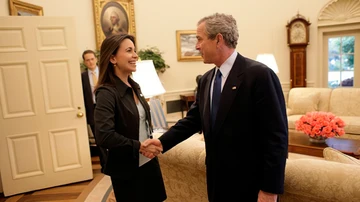“How can you talk about respecting the private sector in Venezuela, when you have dedicated yourself to expropriate, which is stealing“: these words went around the world in 2012, when María Corina Machado addressed the then president of Venezuela, Hugo Chávez. Shortly before uttering this phrase as a representative in the National Assembly of Venezuela, María Corina had already become the candidate with the most votes in the history of the institution, and after the primary electionshas become the one who is expected to be the main opponent of Nicolás Maduro in the 2024 presidential elections, which still have no official call beyond the president’s commitment.
María Corina Machado (Caracas, October 7, 1967) is an industrial engineer specialized in finance, but for many years she has been linked to the politics of her country. In 2002 she founded Súmate, an NGO for electoral transparency and dedicated to the political rights of Venezuelans, although that same year she also signed the Carmona decree, a document establishing a new de facto Government, led by Pedro Carmona, which sought to expel Hugo Chávez from power. Her name in the minutes of the 2002 coup d’état led her to be tried, although later benefited from an amnesty signed by Chávez himselfwhich allowed her to compete in the elections to the National Assembly in 2010, which she entered as a candidate with the most votes in history.
However, his figure became known internationally when in 2005 was received at the White House by the then president, George W. Bush. Corina was received as founder and director of Súmate, whom she invited to “talk”, highly “interested in knowing the perspective of civil society on democracy in the region and in Venezuela”, in the words of María Corina herself. “We talked about the important role that citizens “we are exercising in defense of democracy.”

María Corina, with George W. Bush at the White House in May 2005 | White House/Eric Draper
In 2012, María Corina has already presented herself as a candidate in which it was the first attempt by the Venezuelan opposition to come together in a united manner to put an end to Chavismo. He did so as an independent, although that same year the liberal formation that he ended up coordinating, Vente Venezuela, was born. In those opposition primaries, María Corina faced Pablo Medina, Diego Arria, Pablo Pérez and Henrique Capriles, who then became the unitary opposition candidate. Capriles himself decided not to attend these last primaries of 2023, being politically disqualified, a situation in which María Corina also finds herself.
María Corina Machado was also involved in the ‘The Exit’ campaign of 2014, in order to seek “a peaceful, democratic and constitutional solution” to the Government of Nicolás Maduro already in office and put an end to Chavismo, the same objective with which he is now leaving for the next elections. This initiative was led, in addition to María Corina, by Antonio Ledezma and Leopoldo López, who ended up arrested, convicted and imprisoned only to be released in 2019, leave Venezuela and end up in Madrid, where he has been since then.
The dismissals and disqualifications of María Corina
In 2014, María Corina was dismissed as a member of the Assembly, accused of treason. From Vente Venezuela they point out that it was due to his attendance at a meeting of the Organization of American States (OAS) “to try to speak on behalf of Venezuelans”, although the then president of the National Assembly of Venezuela, Diosdado Cabello, explained that had “agreed” to be Panama’s ambassador to the permanent council of the OAS, thus violating article 149 of the Constitution, which prevents public officials from “accepting positions, honors or rewards from foreign governments.”
A year later, the Comptroller General of the Republic notified the politician a disqualification from public office for one year, by allegedly hiding a series of “concepts” of a labor nature in his declaration of assets. In addition to not being able to run in the elections, he was prohibited from leaving the country. That same year, in 2015, María Corina received the Libertad Prize Cortes of Cádiz, along with fellow opponents Leopoldo López and Antonio Ledezma.
In 2023, shortly before the primary elections, the Comptroller’s Office issued another disqualification order for politicsthis time for 15 years, accusing her of acts that violate “public ethics, administrative morality, the rule of law, peace and sovereignty” of Venezuela, insisting on the administrative irregularities committed during her period as a deputy, but also in its participation in acts of support for the economic bloc imposed on Caracas, by directly linking it with the “usurper” Juan Guaidó.
The European Parliament responded to this disqualification, considering it “another step by the regime to hinder the electoral process and nullify any prospect of a return to democracy”, while calling on the EU to support the holding of free elections in Venezuela, recalling that ” the arbitrary and unconstitutional disqualifications of candidates seriously restrict the right of Venezuelans to elect their representatives.”
After winning the primaries, María Corina has assured that she is prepared to overthrow “obstacles”, “abuses” and adverse “forecasts”, and has announced the preparation of a governance process to “prepare the house” to which, she says, will change if he takes over the Presidency. But the truth is that if her disqualification is not lifted, for now, María Corina cannot run for president in presidential elections.
Source: Lasexta
Ricardo is a renowned author and journalist, known for his exceptional writing on top-news stories. He currently works as a writer at the 247 News Agency, where he is known for his ability to deliver breaking news and insightful analysis on the most pressing issues of the day.












